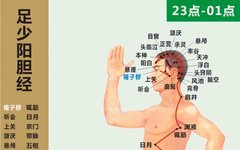The twelve meridians, also known as the twelve primary meridians, are the main components of the meridian system. Their names are determined based on their yin-yang properties, associated organs, and the areas they traverse. Each meridian corresponds to one of the twelve organs, using the name of the respective organ combined with the different locations they traverse on the hands and feet, both internally and externally, as well as front, middle, and back, and are named according to the theory of yin and yang. The names of the twelve meridians are: Hand Taiyin Lung Meridian (Shou Taiyin Fei Jing), Hand Jueyin Pericardium Meridian (Shou Jueyin Xinbao Jing), Hand Shaoyin Heart Meridian (Shou Shaoyin Xin Jing), Hand Yangming Large Intestine Meridian (Shou Yangming Dachang Jing), Hand Shaoyang Sanjiao Meridian (Shou Shaoyang Sanjiao Jing), Hand Taiyang Small Intestine Meridian (Shou Taiyang Xiaochang Jing), Foot Taiyin Spleen Meridian (Zu Taiyin Pi Jing), Foot Jueyin Liver Meridian (Zu Jueyin Gan Jing), Foot Shaoyin Kidney Meridian (Zu Shaoyin Shen Jing), Foot Yangming Stomach Meridian (Zu Yangming Wei Jing), Foot Shaoyang Gallbladder Meridian (Zu Shaoyang Dan Jing), and Foot Taiyang Bladder Meridian (Zu Taiyang Pangguang Jing).
Foot Shaoyang Gallbladder Meridian (Zu Shaoyang Dan Jing)
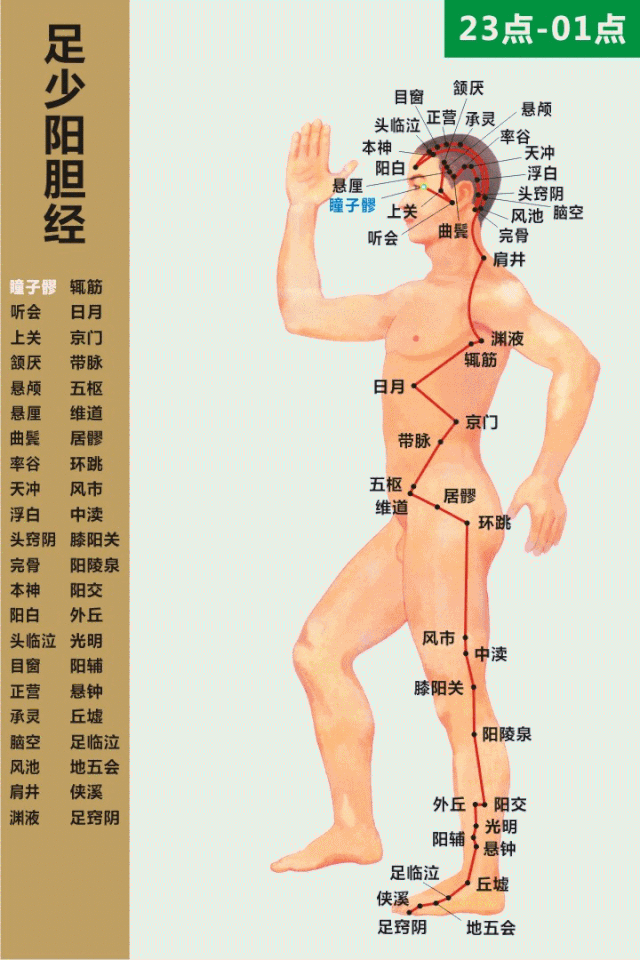
At the Zi hour (23:00-01:00), the Gallbladder Meridian is at its peak, and during this time, the body’s qi and blood are concentrated in the gallbladder. The gallbladder is the repository of the essence, and all eleven meridians depend on the gallbladder, which is characterized by abundant qi and less blood.
Common symptoms: bitter mouth, frequent sighing, pain in the heart and ribs that prevents turning, possibly with a dusty face, lack of moisture in the body, and heat on the outer foot. Headaches, jaw pain, swelling and pain in the lower abdomen, swelling under the armpit, goiter, sweating with chills indicating malaria, pain in the chest, ribs, hips, knees, and all joints, and inability to use the little toe and second toe.
Going to sleep before the Zi hour allows the gallbladder to complete its metabolism, leading to a refreshed mind and rosy complexion upon waking. Conversely, if one does not sleep at this time, the complexion may appear pale and dark under the eyes, and poor bile detoxification may lead to stone formation.
The gallbladder and liver are interrelated.
Foot Jueyin Liver Meridian (Zu Jueyin Gan Jing)
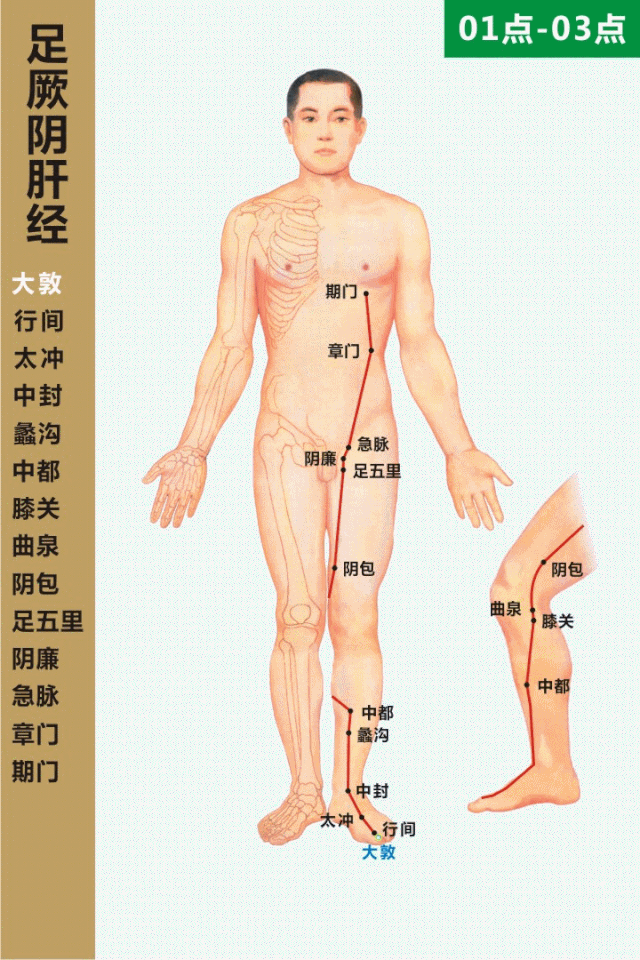
At the Chou hour (01:00-03:00), the Liver Meridian is at its peak, and during this time, the body’s qi and blood are concentrated in the liver. The liver is responsible for storing blood and regulating the flow of qi, characterized by less qi and more blood.
Common symptoms: inability to bend or stretch due to lower back pain, dull complexion, dry throat, fullness in the chest, diarrhea, vomiting, urinary incontinence or retention, hernia, or lower abdominal pain in women.
Deep sleep is recommended during the Chou hour. If one sleeps at this time, blood returns to the liver for storage, completing the body’s metabolism. Conversely, if one does not sleep, the liver may become ill, and spots may appear on the face.
The liver and gallbladder are interrelated.
Hand Taiyin Lung Meridian (Shou Taiyin Fei Jing)
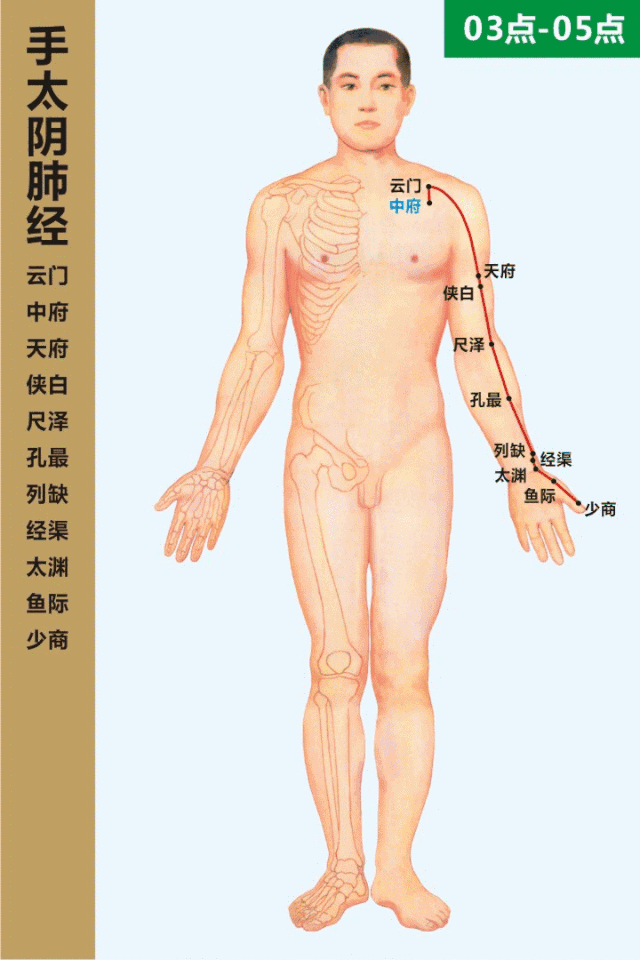
At the Yin hour (03:00-05:00), the Lung Meridian is at its peak. The lungs govern qi, control respiration, and connect to the throat, characterized by abundant qi and blood. During this time, those with lung diseases may react most strongly, possibly experiencing severe coughing or asthma.
Common symptoms: lung distension, coughing and wheezing, fullness in the chest; pain in the diaphragm; shoulder and back pain, or coldness in the shoulder and back, shortness of breath, chills and fever, spontaneous sweating, pain in the inner front of the arm, frequent urination or changes in urine color.
Foods that nourish the lungs: cabbage, pears, tofu, soy milk, milk.
The lungs and large intestine are interrelated.
Hand Yangming Large Intestine Meridian (Shou Yangming Dachang Jing)
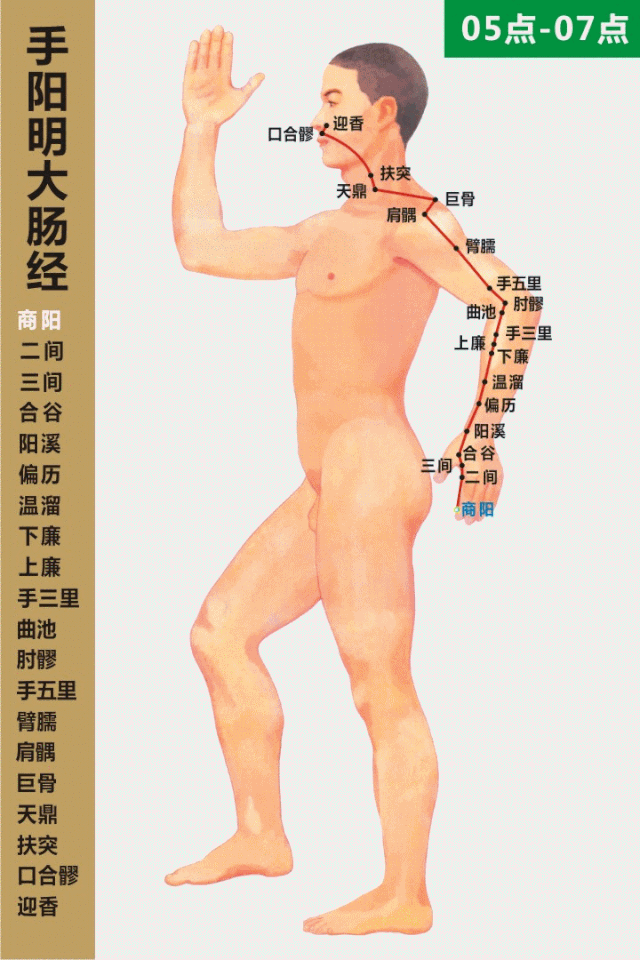
At the Mao hour (05:00-07:00), the Large Intestine Meridian is at its peak. The large intestine is responsible for the transformation of fluids and governs diseases related to body fluids. During this time, it is advisable to have a bowel movement.
Common symptoms: toothache, neck swelling; sore throat, wheezing, nosebleeds, yellow eyes and dry mouth; pain in the front of the shoulder and arm, dull skin; pain and limited movement in the thumb and index finger; abdominal pain and bloating, borborygmi, diarrhea, weakened large intestine function, and constipation.
Foods that nourish the large intestine: eggplant, spinach, bananas, mushrooms, black fungus, corn, lentils, peas, etc.
The large intestine and lungs are interrelated.
Foot Yangming Stomach Meridian (Zu Yangming Wei Jing)
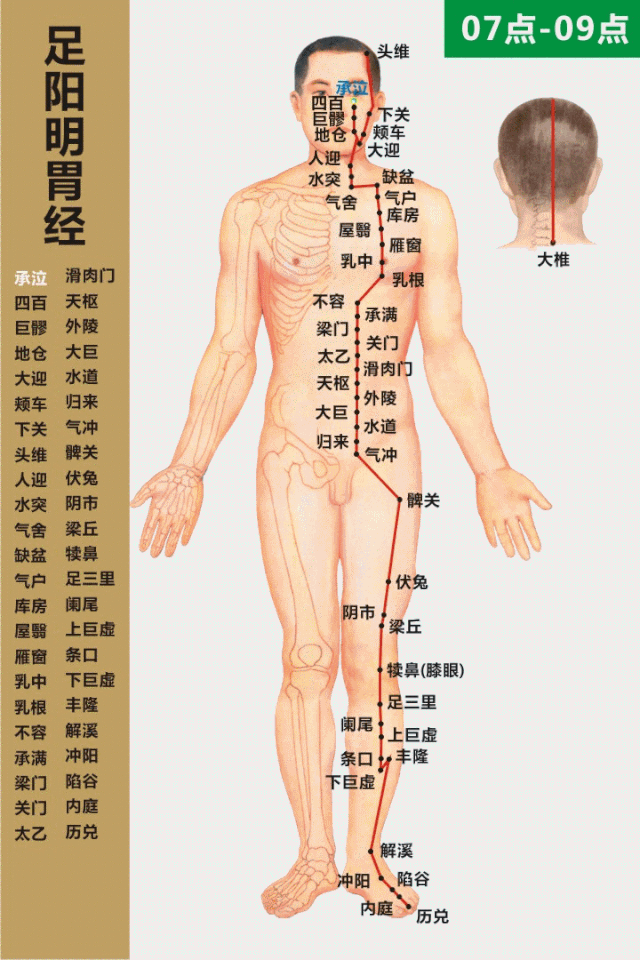
At the Chen hour (07:00-09:00), the Stomach Meridian is at its peak. The Stomach Meridian is rich in qi and blood, and during this time, qi and blood are concentrated in the stomach. Breakfast is important for the stomach and body.
Common symptoms: high fever, sweating, headache, neck swelling, sore throat, toothache, or facial asymmetry, nasal discharge; or nosebleeds; anxiety and irritability; or excessive hunger, indigestion, abdominal fullness, loss of appetite; or swelling and pain in the knees, abdomen, groin, lower limbs, and pain in the back of the foot, with limited movement of the middle toe.
Foods that nourish the stomach: breakfast should be gentle, such as porridge, oatmeal, or steamed buns. Skipping breakfast can lead to various diseases (prolonged hunger can lead to excessive stomach acid, resulting in ulcers, gastritis, duodenitis, cholecystitis, etc.). Prolonged consumption of dry and hot foods can lead to excessive stomach fire, causing dry and cracked lips, and prolonged consumption of cold foods can lead to poor absorption and loose stools.
The stomach and spleen are interrelated.。
Foot Taiyin Spleen Meridian (Zu Taiyin Pi Jing)
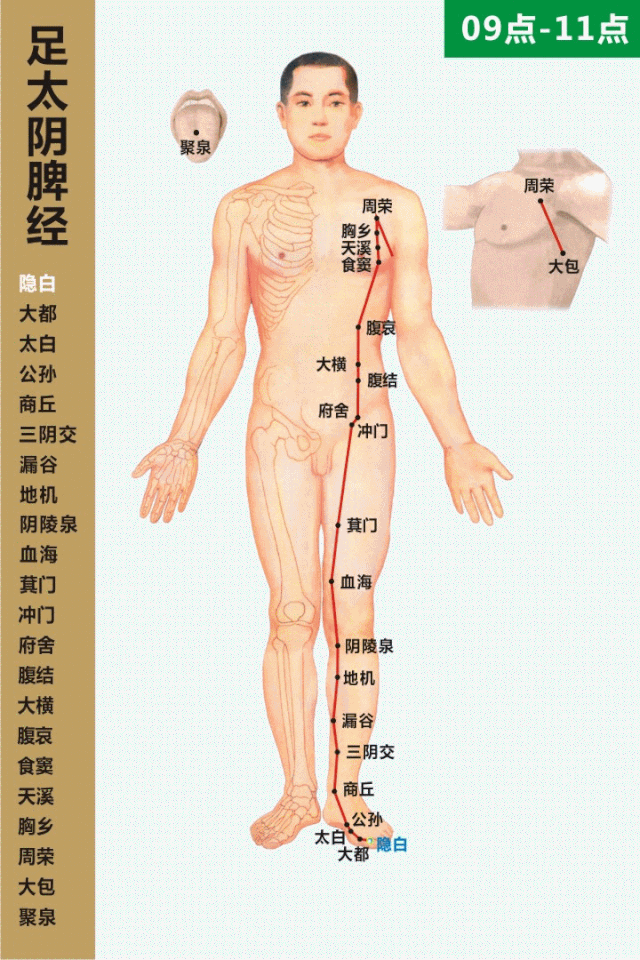
At the Si hour (09:00-11:00), the Spleen Meridian is at its peak. The spleen governs the transportation of fluids from the stomach and is fundamental to the twelve meridians, characterized by less blood and more qi, with qi and blood concentrated in the spleen during this time.
Common symptoms: strong tongue root, vomiting after eating, stomach pain, abdominal bloating and belching, heaviness and fatigue; pain at the root of the tongue, inability to move, loss of appetite, anxiety and insomnia, urgent pain in the chest, diarrhea, jaundice, inability to lie down, swelling and numbness in the inner thigh and knee, and inability to use the big toe.
The spleen opens to the mouth, and its manifestation is on the lips. A healthy spleen results in red and moist lips, while a weak spleen leads to pale lips, and a cold spleen results in dark purple lips.
Foods that nourish the spleen: beef, lamb, pork, lentils, sweet potatoes, potatoes, tofu, celery, corn, rice, as well as apples, oranges, lemons, oranges, green tea, herbal tea, honey, etc.
The spleen and stomach are interrelated.
Hand Shaoyin Heart Meridian (Shou Shaoyin Xin Jing)
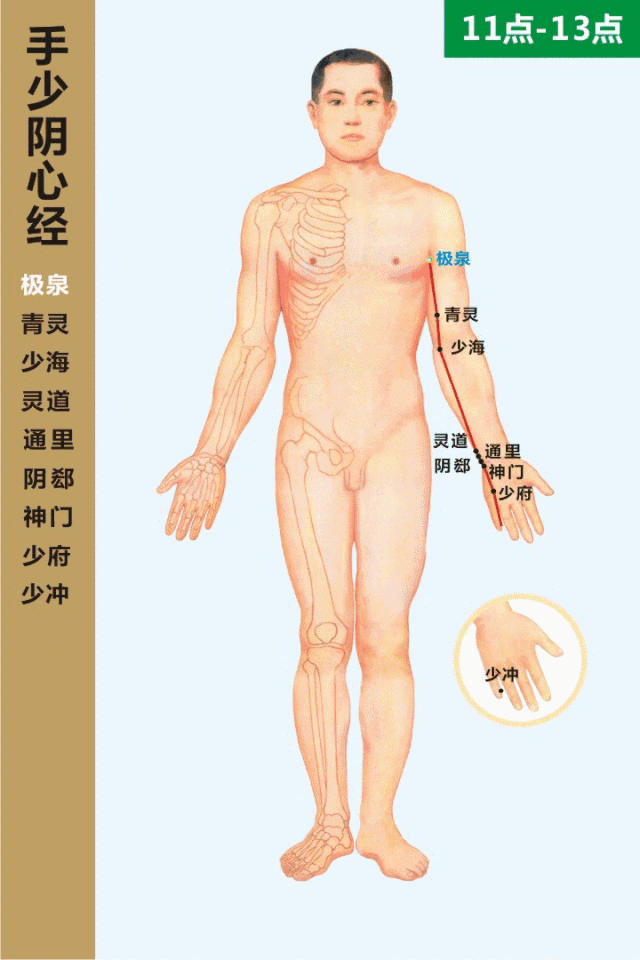
At the Wu hour (11:00-13:00), the Heart Meridian is at its peak, and the body’s qi and blood are concentrated in the heart.
The Heart Meridian has less qi and more blood, and all the qi of the twelve meridians responds to the heart, while all the essence of the twelve meridians nourishes the heart, making it the source of life, the residence of the spirit, the master of blood, and the root of the pulse.
Common symptoms: chest tightness and pain, dry throat, thirst, yellow eyes, rib pain, pain in the inner side of the arm, and heat in the palms.
Taking a short break at noon helps to nourish qi and calm the spirit.
The heart and small intestine are interrelated.
Hand Taiyang Small Intestine Meridian (Shou Taiyang Xiaochang Jing)
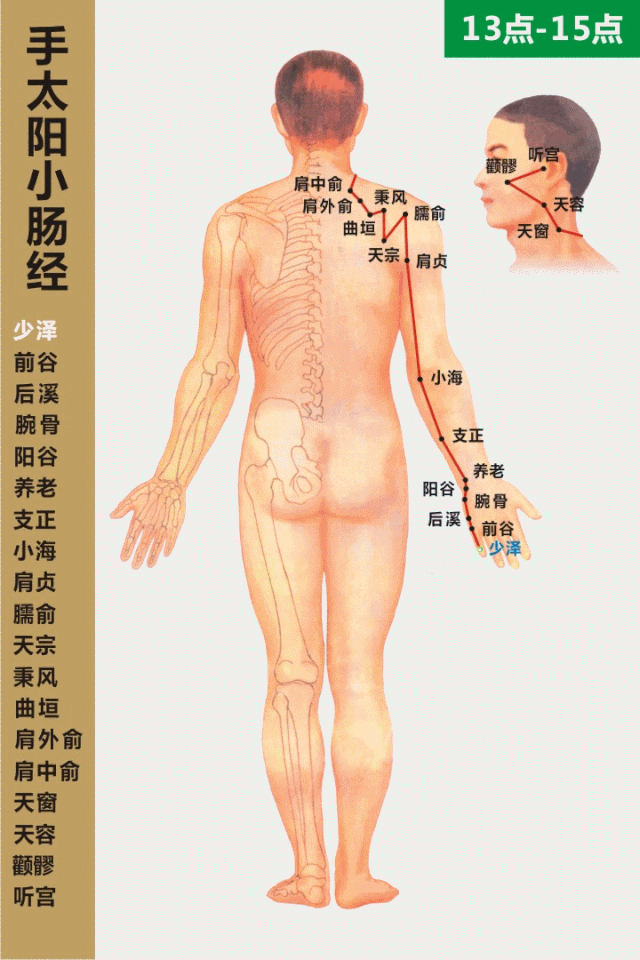
At the Wei hour (13:00-15:00), the Small Intestine Meridian is at its peak, characterized by less qi and more blood, and during this time, qi and blood are concentrated in the small intestine. It is advisable to drink tea to help the small intestine detoxify and reduce heat.
The small intestine is the organ of reception and transformation, distinguishing between clear and turbid: it directs fluids to the bladder, sends waste to the large intestine, and transports essence to the spleen.
Common symptoms: deafness, yellow eyes, sore throat; pain in the shoulder as if pulled, pain in the arm as if broken. Pain in the neck, shoulder, elbow, and outer arm.
Heat in the small intestine can cause dry cough and frequent urination.
The small intestine and heart are interrelated.
Foot Taiyang Bladder Meridian (Zu Taiyang Pangguang Jing)
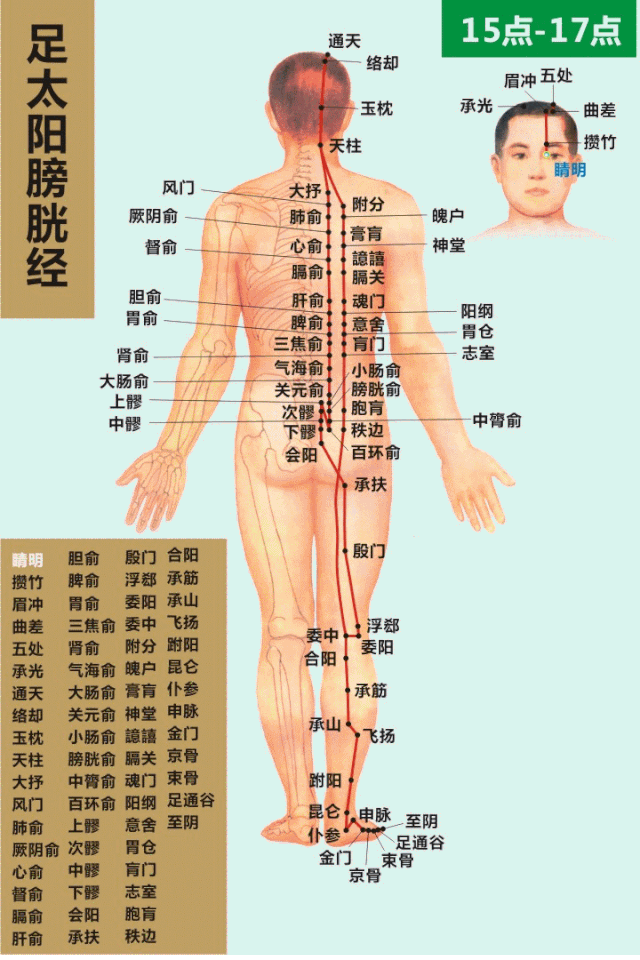
At the Shen hour (15:00-17:00), the Bladder Meridian is at its peak, and during this time, qi and blood are concentrated in the bladder. The bladder stores fluids, characterized by less qi and more blood.
Common symptoms: fever, aversion to wind and cold, nasal discharge, headache, stiffness in the neck and back; feeling as if the eyes are falling out, neck feels pulled, waist feels broken, knee feels knotted, and foot feels cracked; epilepsy, mania, malaria, hemorrhoids; pain in the lower back, popliteal fossa, calf muscles, heel, and little toe, with limited movement.
Heat in the bladder can cause coughing and urinary incontinence. Drinking tea is beneficial for those with yin deficiency.
The bladder and kidney are interrelated.
Foot Shaoyin Kidney Meridian (Zu Shaoyin Shen Jing)
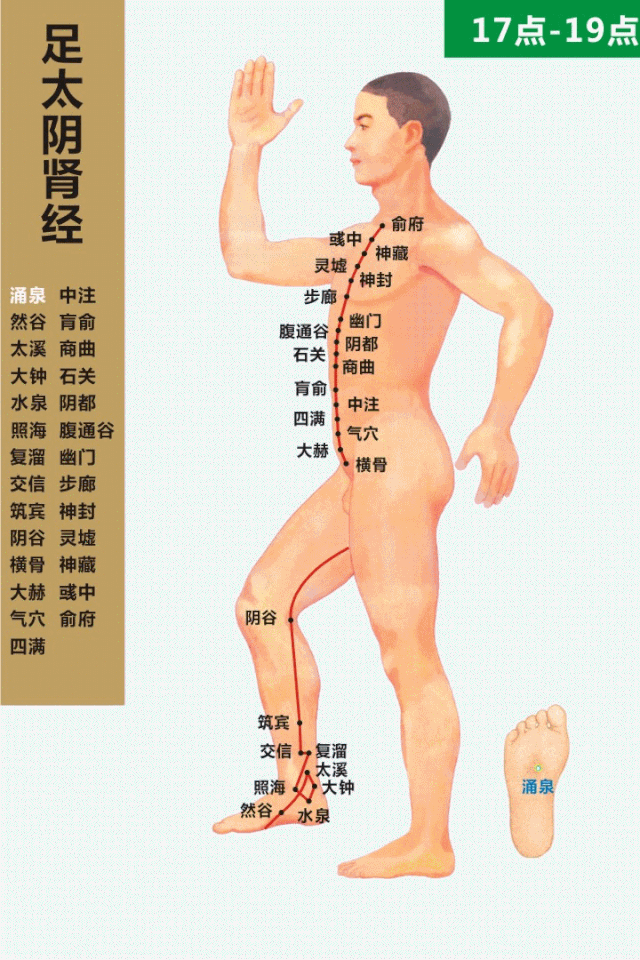
At the You hour (17:00-19:00), the Kidney Meridian is at its peak, and during this time, qi and blood are concentrated in the kidneys. It is not advisable to engage in intense exercise or drink large amounts of water at this time.
The kidneys store essence and govern water, representing the initial transformation of yang energy, characterized by less qi and more blood, and are the root of congenital energy.
Common symptoms: dark complexion, dizziness; shortness of breath, coughing up blood; lack of appetite, chest pain, weakness or numbness in the lower back and legs, heat and pain in the feet; irritability, easy to startle, fearfulness, dry mouth and tongue, swollen throat.
The kidneys and bladder are interrelated.
Hand Jueyin Pericardium Meridian (Shou Jueyin Xinbao Jing)
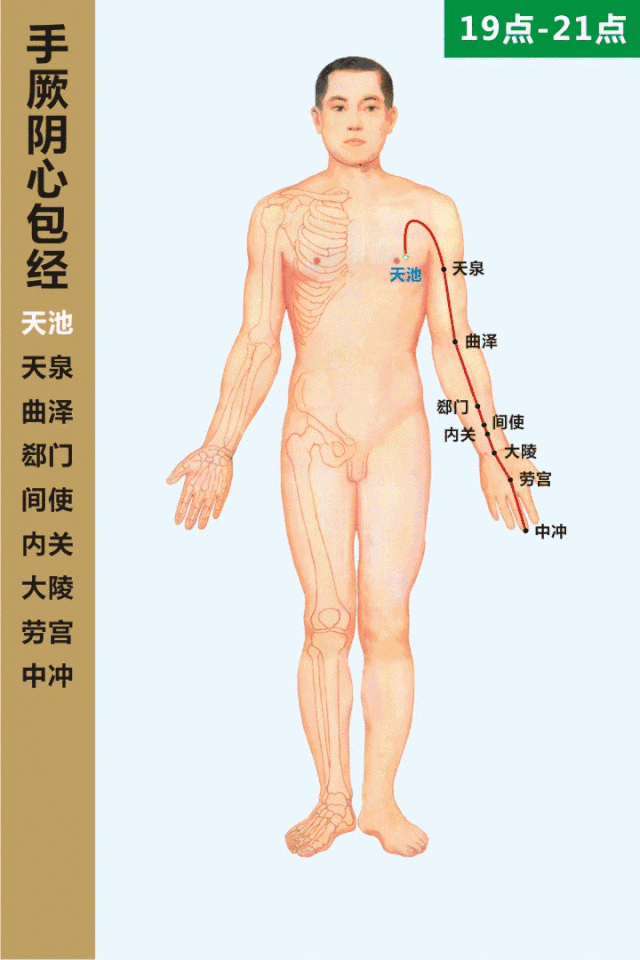
At the Xu hour (19:00-21:00), the Pericardium Meridian is at its peak, and during this time, qi and blood are concentrated in the pericardium. The pericardium is the palace of the heart, associated with fire, and acts on behalf of the heart, characterized by less qi and more blood.
Common symptoms: heat in the palms, cramping in the elbows, swelling in the armpits, and possibly fullness in the chest and ribs, irritability, palpitations, chest pain, excessive laughter, and yellowing of the face and eyes.
During the Xu hour, it is advisable to relax and relieve stress: reading, listening to music, dancing, practicing Tai Chi, standing meditation, or sitting quietly.
The pericardium and Sanjiao are interrelated.
Hand Shaoyang Sanjiao Meridian (Shou Shaoyang Sanjiao Jing)
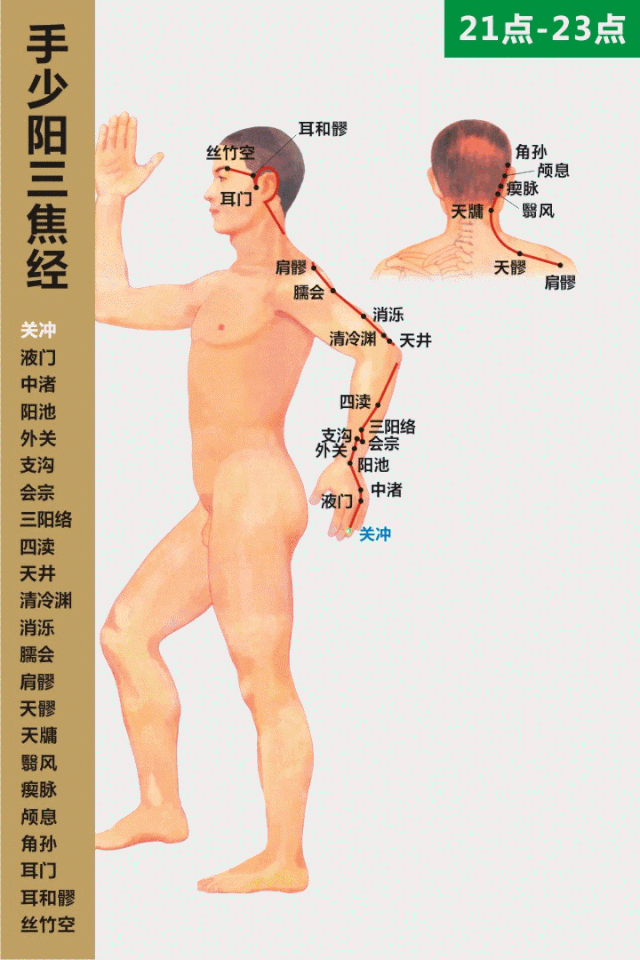
At the Hai hour (21:00-23:00), the Sanjiao Meridian is at its peak, and during this time, qi and blood are concentrated in the Sanjiao.
The Sanjiao is the largest of the six fu organs, serving as the pathway for the transformation of food essence and the metabolism of fluids, governing the body’s qi transformation, characterized by less blood and more qi.
Common symptoms: deafness, pain in the heart and ribs, sharp pain in the eyes, pain behind the cheeks and ears, sore throat, sweating, pain in the shoulder and elbow, and limited movement in the little and index fingers.
During the Hai hour, the Sanjiao can open all meridians. If one sleeps during this time, all meridians can achieve optimal rest and recovery, which is very beneficial for the body and appearance. A common trait among centenarians is sleeping during the Hai hour.
Thank you for reading, and let us work together for health!

